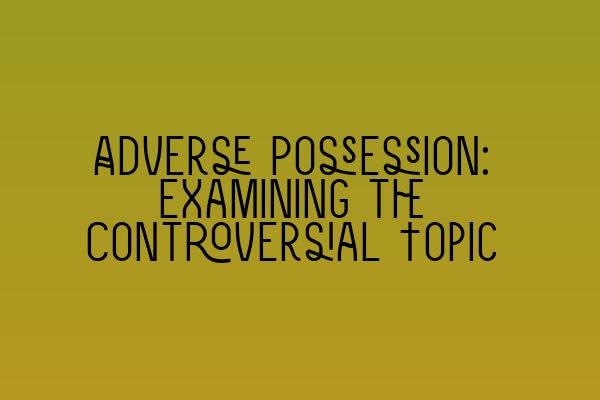Adverse Possession: Examining the Controversial Topic
Welcome to the SQE Property Law & Land Law blog, where we dive deep into the legal intricacies of property law to provide you with valuable insights and updates. In today’s post, we will explore the controversial topic of adverse possession – a legal doctrine that has sparked much debate and litigation in the field of property law.
What is Adverse Possession?
Adverse possession refers to a legal principle that allows an individual to gain ownership rights over a piece of land or property by occupying it for a certain period, without the permission of the legal owner. This doctrine has its roots in common law and has evolved over centuries.
To establish adverse possession, the claimant must meet specific requirements. Firstly, they must demonstrate that they have been in possession of the land continuously and exclusively for a specified period, which varies depending on the jurisdiction. Secondly, they must show that their possession has been actual, open, and notorious, meaning that it is not hidden or secretive. Lastly, they must prove that their possession has been adverse, meaning that they are not the rightful owner or have the owner’s permission.
The Controversy Surrounding Adverse Possession
Adverse possession is a topic of controversy for several reasons. One of the key concerns stems from the idea that it allows individuals to acquire another person’s property without compensation or any explicit permission. Critics argue that this undermines the sanctity of property rights and can lead to unjust outcomes.
Another point of contention relates to the fairness of the statutory time periods required for adverse possession claims. While the time period provides finality and certainty to property rights and promotes the efficient use of land, some believe that it may be too long or too short, depending on the circumstances. The balancing act between protecting property owners’ rights and facilitating the orderly transfer of title is a complex issue that continues to be debated.
Impact on Property Transactions
Adverse possession can have significant implications for property transactions. Prospective buyers and sellers must be aware of any potential adverse possession claims that could affect the title of the property. Failure to address these issues can lead to disputes and legal challenges down the line, potentially jeopardizing the validity of the transaction.
For sellers, it is crucial to conduct a thorough title search and disclose any adverse possession claims or circumstances that may arise. This transparency allows buyers to make an informed decision and take appropriate measures to mitigate any risks associated with adverse possession.
On the other hand, buyers must exercise due diligence when acquiring property, including conducting extensive research and seeking legal advice. They should carefully review the property’s history, survey reports, and any other relevant documents to identify any potential adverse possession claims. Taking these precautions can help avoid future disputes and ensure a smooth and secure property transaction.
Legal Advice and Expertise
Given the complexities surrounding adverse possession, it is essential to seek professional legal advice. At SQE Property Law & Land Law, we offer expert guidance on adverse possession matters, helping clients navigate through the intricacies of property law. Our experienced solicitors have an in-depth understanding of the legal principles and case law surrounding adverse possession and can provide tailored solutions to meet your specific needs.
If you are preparing for the SQE 1 or SQE 2 exams, we also offer comprehensive preparation courses to help you succeed. With our SQE 1 Practice Exam Questions and Practice Mocks FLK1 FLK2, you can test your knowledge and enhance your skills in property law. Check out our SQE 1 and SQE 2 Preparation Courses to equip yourself with the necessary tools and knowledge to excel in the exams.
Stay Updated on SRA SQE Exam Dates
For aspiring solicitors, it is vital to stay informed about the SRA SQE exam dates. Timely preparation is key to achieving success in these rigorous exams. Stay up-to-date with the latest exam schedules by visiting our SRA SQE Exam Dates page.
In Conclusion
Adverse possession remains a controversial topic in property law, raising important questions about property ownership and rights. While the doctrine has its critics, it also serves a purpose in promoting the efficient use and transfer of land. Understanding the intricacies and implications of adverse possession is crucial for property owners, buyers, and legal professionals alike.
If you require legal advice or have any questions regarding adverse possession or any other property law matters, feel free to contact us. Our team of solicitors is here to provide expert assistance and guide you through the complex landscape of property law.
